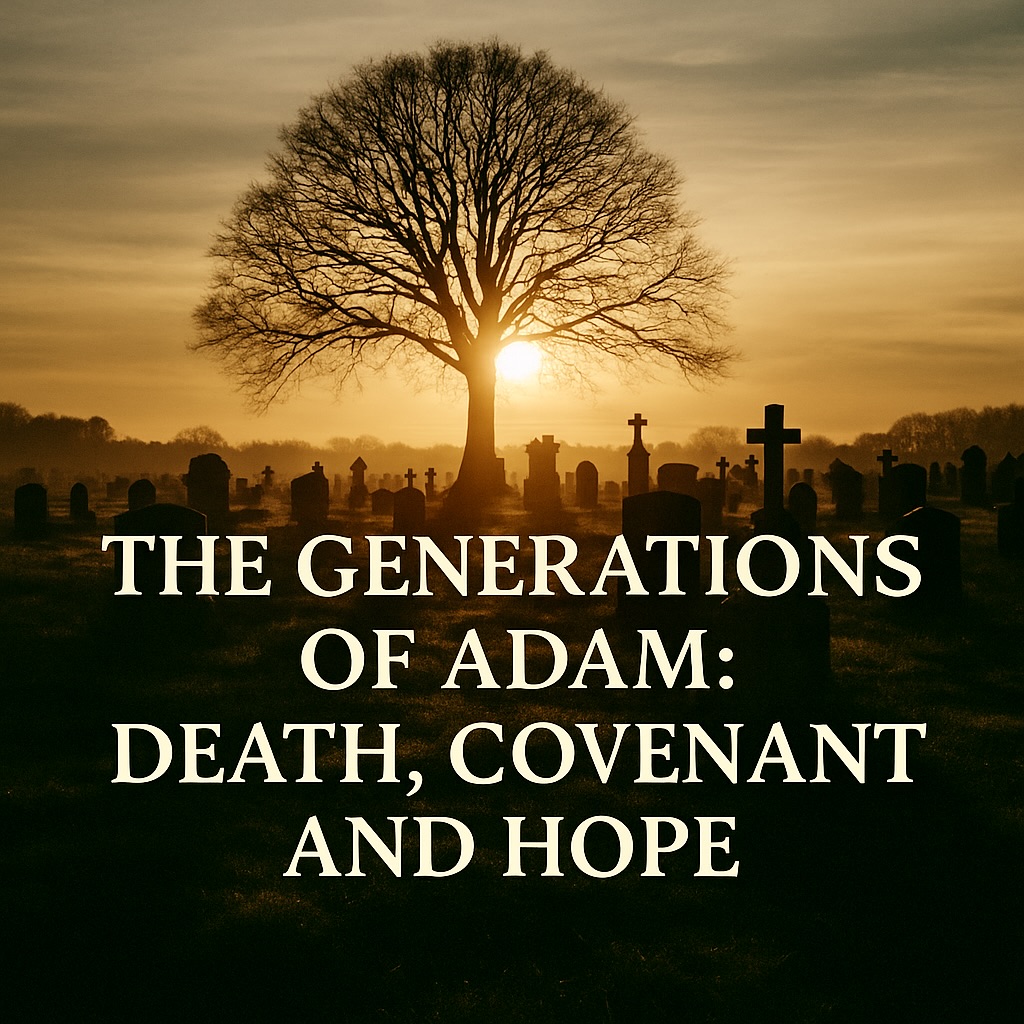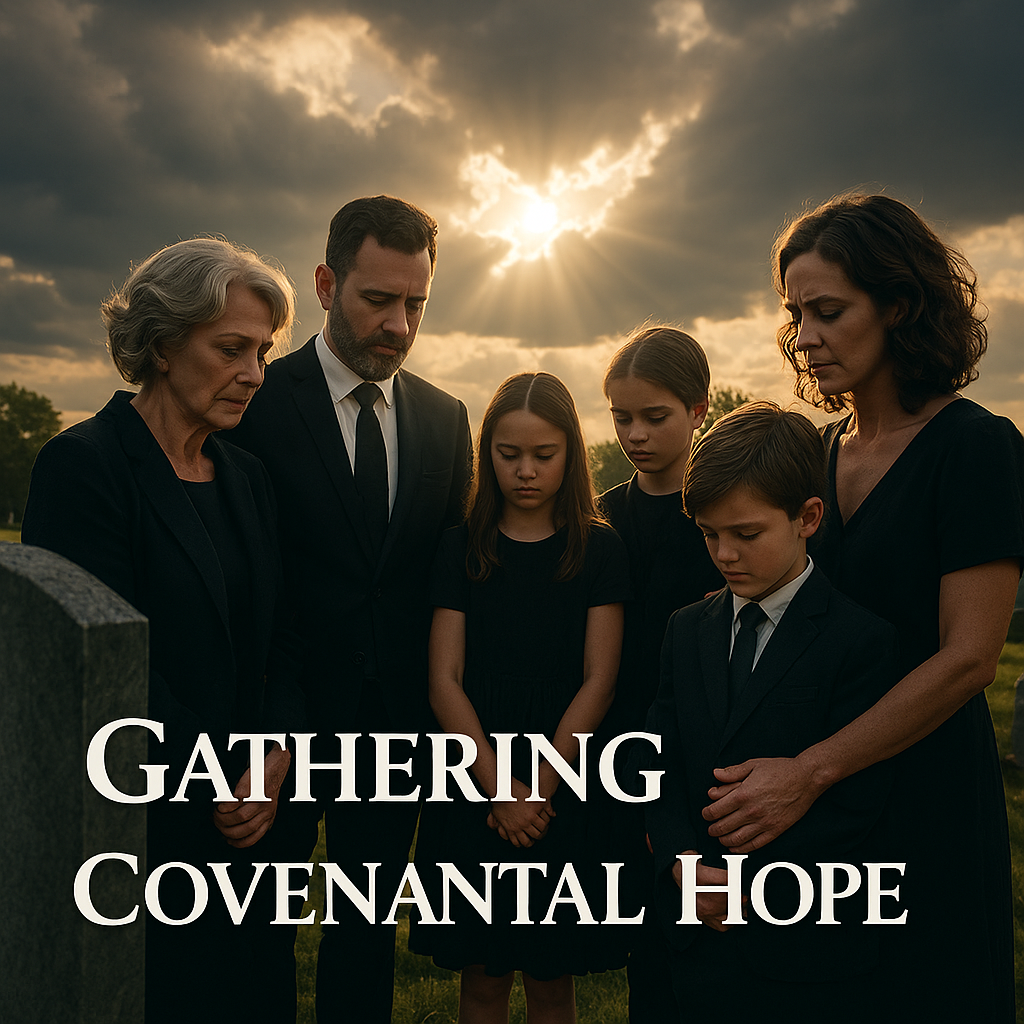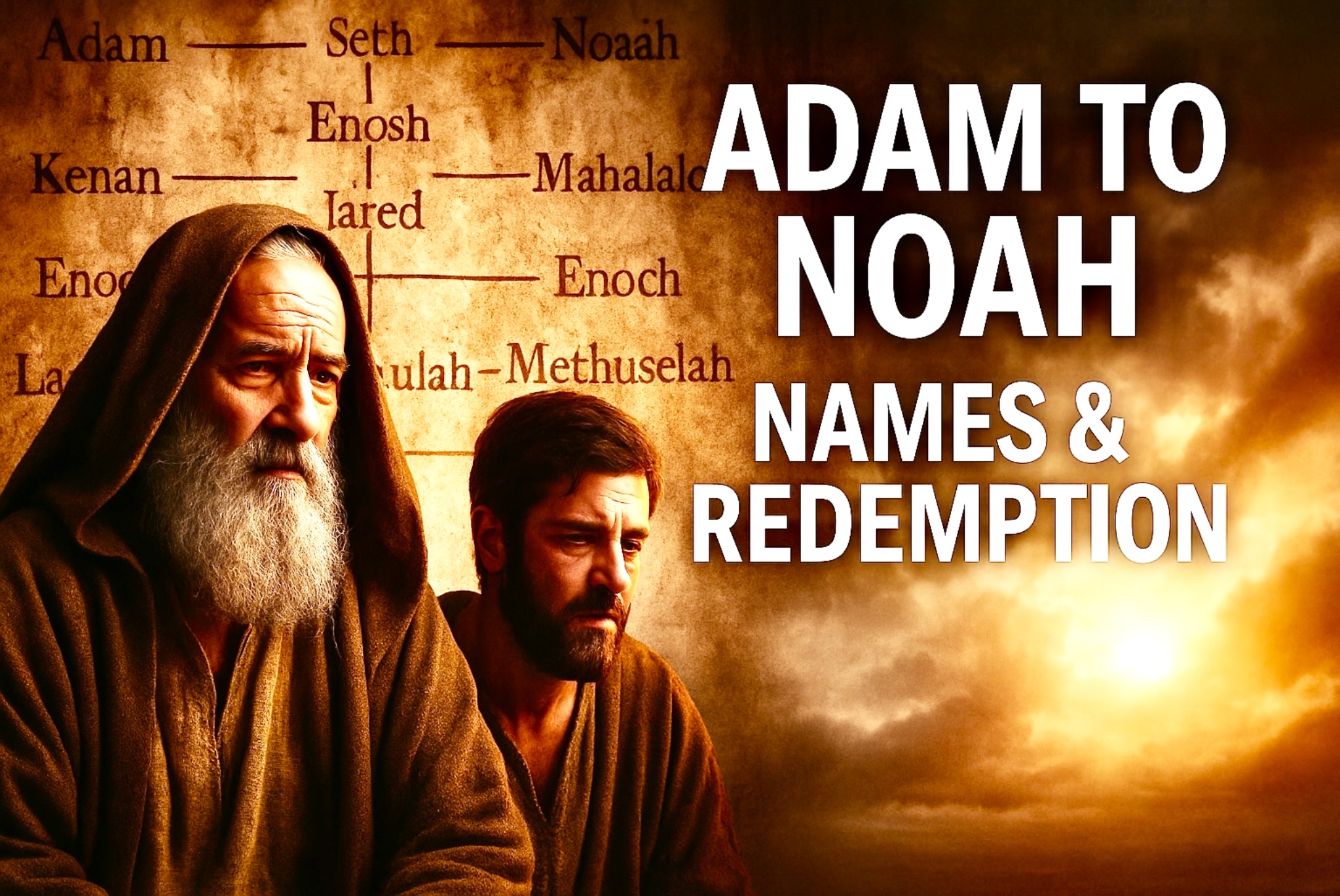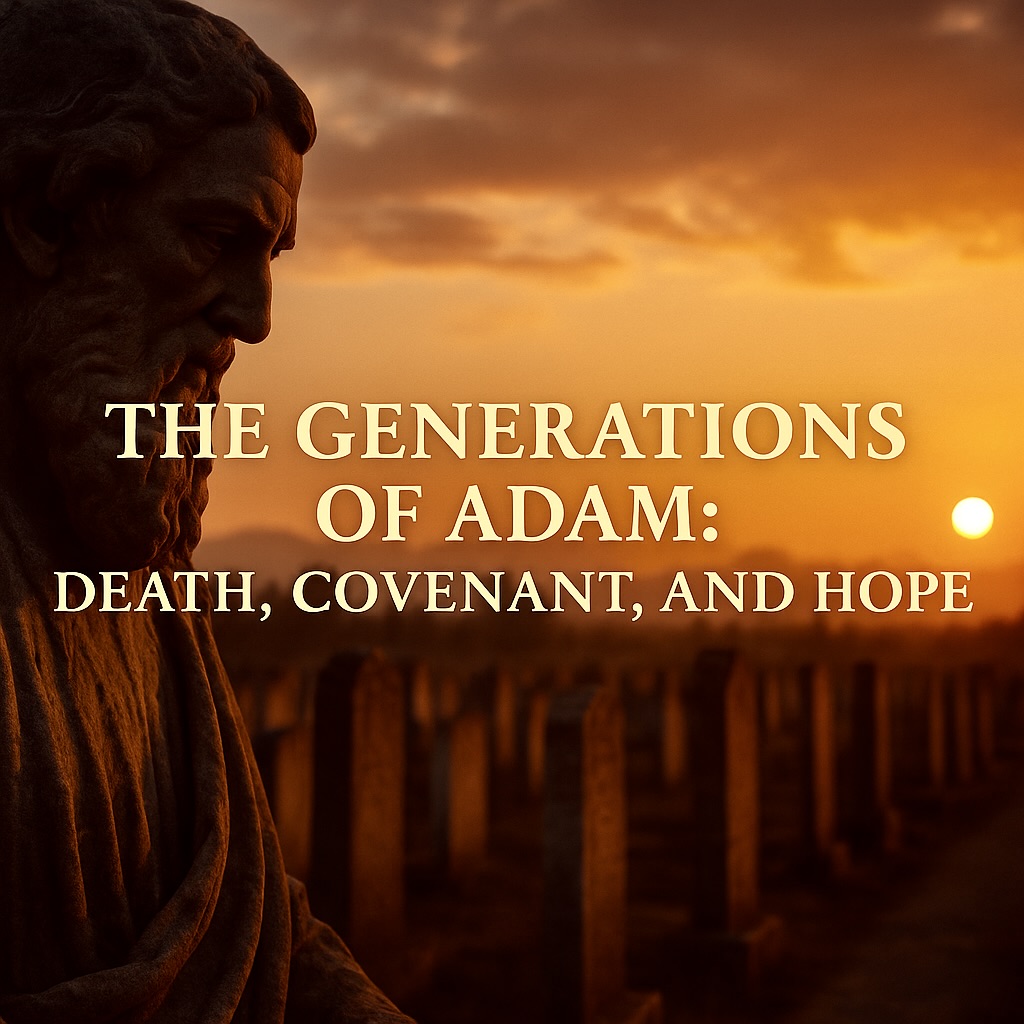The Generations of Adam: Death, Covenant, and Hope | Genesis 5 Explained
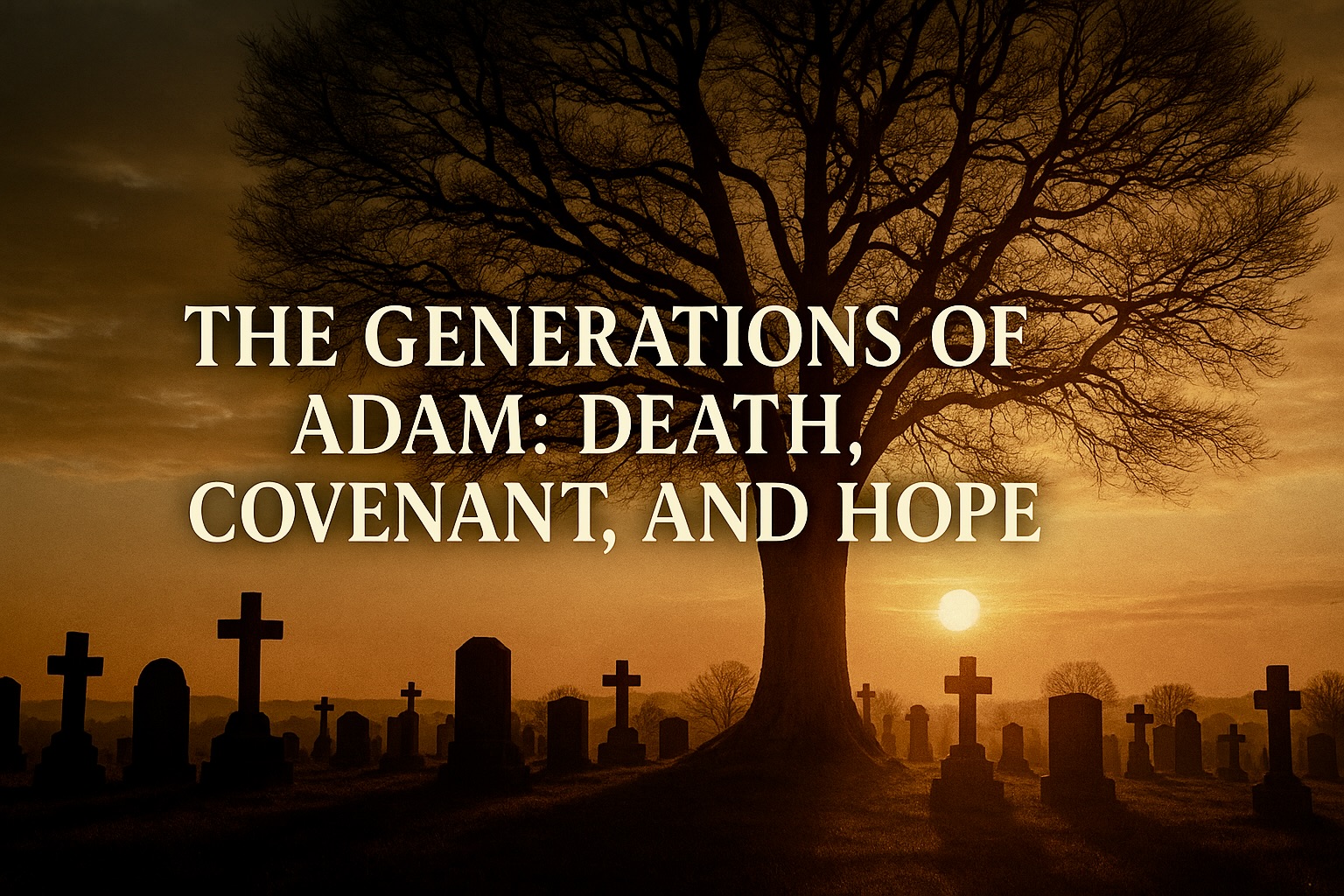
The Generations of Adam: Death, Covenant, and Hope
Genesis: Foundations of Covenant and Redemption — Episode 5
Most people skip Genesis 5. To them it is a graveyard of names, a long roll call of strange lifespans ending with the same refrain: “and then he died.” Yet if you pass it by too quickly, you miss its depth. Hidden within this so-called dry genealogy is theology in flesh and blood.
WATCH on RUMBLE and Click on FOLLOW NOW in case we get de-platformed on YouTube!
Genesis 5 is not a filler chapter. It is covenant architecture. It is the relentless march of death, the tolling of mortality across Adam’s line. But it is also the relentless faithfulness of God. Death speaks, but covenant speaks louder. Here, amid the drumbeat of “and then he died,” we hear whispers of Gospel hope.
Here is Enoch, who walked with God and did not see death. Here is Methuselah, whose long life embodied divine patience. Here is Noah, whose name means “rest” and points forward to redemption. Even in the shadow of mortality, God’s mercy shines.
The Drumbeat of Death
Genesis 5 fulfills the word God spoke in Genesis 2:17. “On the day you eat of it, you will surely die.” Adam and Havah did not die at once, but from that moment forward death was humanity’s destiny. The genealogy reads like the tolling of a funeral bell: he lived, he fathered, he died.
And yet, each name proves that the Seed continues. Fruitfulness and death walk hand in hand, but covenant does not fail.
Names That Preach
Names in Hebrew often carry prophetic weight. Many Jewish teachers and Christian scholars have noted that the names in Genesis 5, when strung together, form a hidden sentence of hope:
Adam (Man), Seth (Appointed), Enosh (Mortal), Kenan (Sorrow), Mahalalel (The Blessed God), Jared (Shall Come Down), Enoch (Teaching), Methuselah (His Death Shall Bring), Lamech (Despairing), Noah (Rest).
Together: “Man is appointed mortal sorrow. The Blessed God shall come down teaching. His death shall bring the despairing rest.”
Even if we hold the linguistic details with caution, the message is clear: God tells the truth about mortality, but He also promises comfort, rest, and redemption.
Enoch: Walking With God
In a chapter dominated by death, one name breaks the pattern. Twice we are told: Enoch walked with God. He lived in ongoing, intimate communion. Then, the text simply says, “and he was not, for God took him.”
The New Testament affirms this in Hebrews 11:5: “By faith Enoch was taken so that he did not experience death… for before he was taken he was commended as one who pleased God.”
Enoch’s story is not myth. It is testimony. In a world where every name ends in death, God shows that covenant faithfulness transcends the grave.
Methuselah: Mercy in Numbers
Methuselah’s 969 years make him the longest-lived man in Scripture. Jewish tradition holds that the year he died was the year of the Flood. His very name, often understood as “his death shall bring,” speaks of judgment delayed. His long life was not an accident. It was mercy stretched out across centuries.
God was patient, not wishing any to perish, but longing for repentance. Methuselah’s years embody the truth Peter later declares: God’s slowness is salvation.
Noah: Rest and Redemption
Lamech named his son Noah, saying, “This one will comfort us from the labor and the painful toil of our hands, caused by the ground which Adonai cursed.” His name means “rest.”
Noah becomes the hinge between the violence of the old world and the covenant renewal that follows. In him the line of Adam is preserved. In him the promise of rest is carried forward. And in his name we hear the echo of Yeshua, the true Noah, who offers rest for weary souls.
Challenge and a Choice
Genesis 5 calls us to face death honestly and covenant hope faithfully.
•The Challenge: Will your life be a mere record of years that ends with “and then he died,” or will it testify, “he walked with God”?
•The Choice: Will you live like Cain, consumed by envy, or like Enoch, in communion with God? Will you despair in mortality, or rest in the Messiah, the one who brings eternal comfort?
Prayer of Salvation
Our Father, our King,
I come to You with humility and faith. I admit that I have sinned and fallen short of Your glory, just as it is written in Romans 3:23.
I turn away from my sins in repentance and I return to You. I believe that Jesus the Messiah is the promised Savior, the Son of the Living God, that He died for my sins, was buried, and rose again on the third day, just as the Scriptures foretold in Isaiah 53, Psalm 22, and 1 Corinthians 15:3–4.
Your Word says in Joel 2:32 and Romans 10:13, “Everyone who calls on the Name of the Lord will be saved.” Today, I call on Your Holy Name.
Forgive me, cleanse me, and make me new. Fill me with the Holy Spirit and write Your teaching and instruction on my heart, as You promised in Jeremiah 31:33. From this day forward, I choose to follow Jesus as my Lord, my Redeemer, and my King.
Thank You for saving me, making me part of Your covenant people, and giving me eternal life. In the Name of Jesus the Messiah, the King of Kings, I pray. Amen.
If you just placed your faith and life into the blessed hands of the Lord, I am excited for you! This is the most important thing you could ever do! I want to help you every step of the Way. Contact me through TrueWordFaithforLife.com and I promise to get back to you as soon as I receive your message. Or, if you just have questions you do not want to put into comments here on the channel, reach out — I would love to hear from you.
Genesis 5 is more than a genealogy. It is the story of mortality told in names and years, but it is also the story of mercy written in covenant ink. The refrain of “and then he died” cannot silence the greater refrain of “and God was faithful.”
Live like Enoch. Walk with God. Hold fast to Noah’s promise of rest. And find your hope in Yeshua, the true Noah, who gives eternal comfort.
Shalom b’Shem Yeshua.
⸻
📖 Study Guide
Genesis: Foundations of Covenant and Redemption
Episode 5 — The Generations of Adam: Death, Covenant, and Hope
What is your first reaction when you encounter a biblical genealogy? Do you skim or skip it? What might God be teaching us through lists of names that march across centuries?
⸻
Scripture Reading
Read Genesis 5:1–32
⸻
Section 1 — The Drumbeat of Death
•Each generation ends: “and then he died.”
•Mortality reigns, but God’s covenant promise continues.
Reflection Questions:
1.Why does Genesis 5 emphasize death so heavily?
2.How does this shape our understanding of Genesis 2:17 and the reality of sin?
⸻
Section 2 — Names That Preach
•Names form a prophetic sequence that points to Messiah.
•Even if debated, the message of hope in the genealogy is undeniable.
Reflection Questions:
1.What does this hidden sentence of names teach us about God’s redemptive plan?
2.How does this strengthen your confidence in Scripture’s unity?
⸻
Section 3 — Enoch Walked With God
•Only Enoch breaks the pattern of death.
•Walking with God is more than ritual. It is communion.
Reflection Questions:
1.What does it mean to “walk with God” in your daily life?
2.How do intimacy, obedience, and faith shape covenant faithfulness?
⸻
Section 4 — Methuselah: Mercy in Numbers
•His long life reflects divine patience before judgment.
•God’s delay is salvation, not indifference.
Reflection Questions:
1.How does Methuselah’s story help us understand God’s patience in our own time?
2.Where do you need to trust God’s timing instead of rushing His justice?
⸻
Section 5 — Noah: Rest and Redemption
•Noah’s name prophesies comfort and rest.
•He points forward to Messiah as the true source of rest.
Reflection Questions:
1.Where do you most need God’s rest today?
2.How does Noah’s story prepare us for Yeshua’s invitation in Matthew 11:28–29?
⸻
Application — Challenge and a Choice
•Challenge: Will your years simply add up to “and then he died,” or will they testify that you walked with God?
•Choice: Will you live in despair, or will you rest in Messiah, the Redeemer who brings eternal comfort?
⸻
Key Takeaways
•Genealogies are covenant testimonies, not filler text.
•Death reigns, but God’s covenant endures.
•Enoch shows intimacy with God that transcends death.
•Methuselah shows God’s patience before judgment.
•Noah points us to rest and redemption fulfilled in Messiah.
Footnotes
1.Gordon J. Wenham, Genesis 1–15, Word Biblical Commentary 1, Grand Rapids, MI, Zondervan, 1987, 118–121.
2.The popular summary of Genesis 5 name meanings and its Gospel sentence has been widely circulated in evangelical teaching. For representative discussion, see Nahum M. Sarna, Genesis, The JPS Torah Commentary, Philadelphia, The Jewish Publication Society, 1989, 39–41. For pastoral use with caution on etymologies, see Victor P. Hamilton, The Book of Genesis: Chapters 1–17, NICOT, Grand Rapids, MI, Eerdmans, 1990, 254–259.
3.Michael S. Heiser, The Unseen Realm: Recovering the Supernatural Worldview of the Bible, Bellingham, WA, Lexham, 2015, 63–66. Heiser urges restraint in speculative etymologies while affirming the theological arc toward Messiah.
4.Complete Jewish Study Bible, ed. Barry Rubin and David H. Stern, Peabody, MA, Hendrickson, 2016, notes on Genesis 5:22–24 and Hebrews 11:5. See also Richard Bauckham, Jude and the Relatives of Jesus in the Early Church, London, T&T Clark, 2004, 96–101 on Jude’s Enoch traditions.
5.John H. Walton, Genesis 1–11, NIV Application Commentary, Grand Rapids, MI, Zondervan, 2001, 276–279; cf. 2 Peter 3:9 on divine patience.
6.Kenneth A. Kitchen, On the Reliability of the Old Testament, Grand Rapids, MI, Eerdmans, 2003, 446–449 on ancient age lists; compare Sumerian King Lists as cultural background without forcing equivalence.
7.Michael S. Heiser, The Unseen Realm, 103–117 on Genesis 6:1–4 as a key node in the biblical story of rebellion and redemption.
Bibliography
Bauckham, Richard. Jude and the Relatives of Jesus in the Early Church. London: T&T Clark, 2004.
Hamilton, Victor P. The Book of Genesis: Chapters 1–17. New International Commentary on the Old Testament. Grand Rapids, MI: Eerdmans, 1990.
Heiser, Michael S. The Unseen Realm: Recovering the Supernatural Worldview of the Bible. Bellingham, WA: Lexham, 2015.
Kitchen, Kenneth A. On the Reliability of the Old Testament. Grand Rapids, MI: Eerdmans, 2003.
Sarna, Nahum M. Genesis. The JPS Torah Commentary. Philadelphia: The Jewish Publication Society, 1989.
Walton, John H. Genesis 1–11. NIV Application Commentary. Grand Rapids, MI: Zondervan, 2001.
Wenham, Gordon J. Genesis 1–15. Word Biblical Commentary 1. Grand Rapids, MI: Zondervan, 1987.
Complete Jewish Study Bible, edited by Barry Rubin and David H. Stern. Peabody, MA: Hendrickson, 2016.
Moen, Skip. Today’s Word archives on halak and covenant faithfulness. Orlando, FL: At God’s Table, various dates.
© 2025 Shawn M. Greener. All rights reserved.
#Genesis5 #BibleTeaching #Enoch #Noah #CovenantFaithfulness #TrueWordFaithforLIFE #FollowerOfTheWay #Messiah #Redemption
